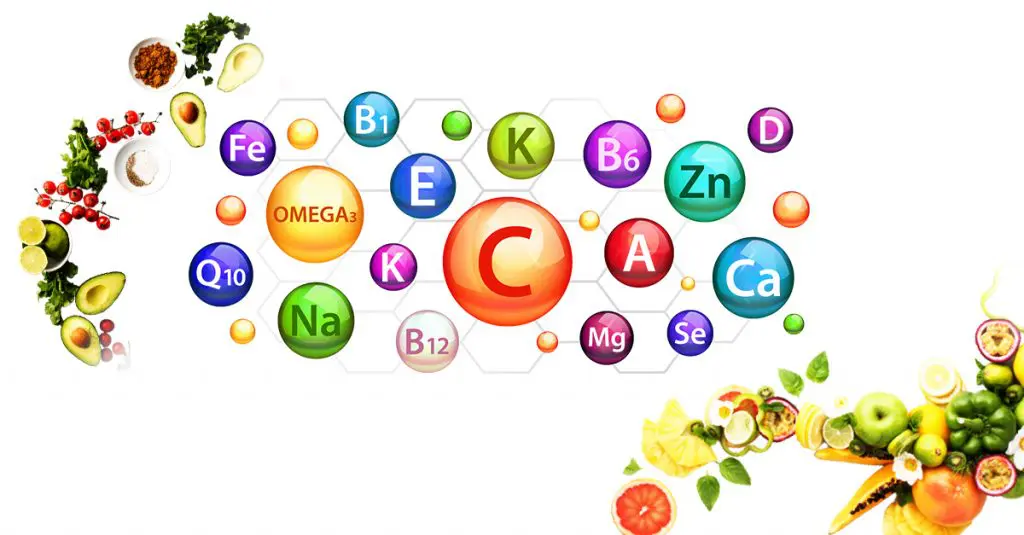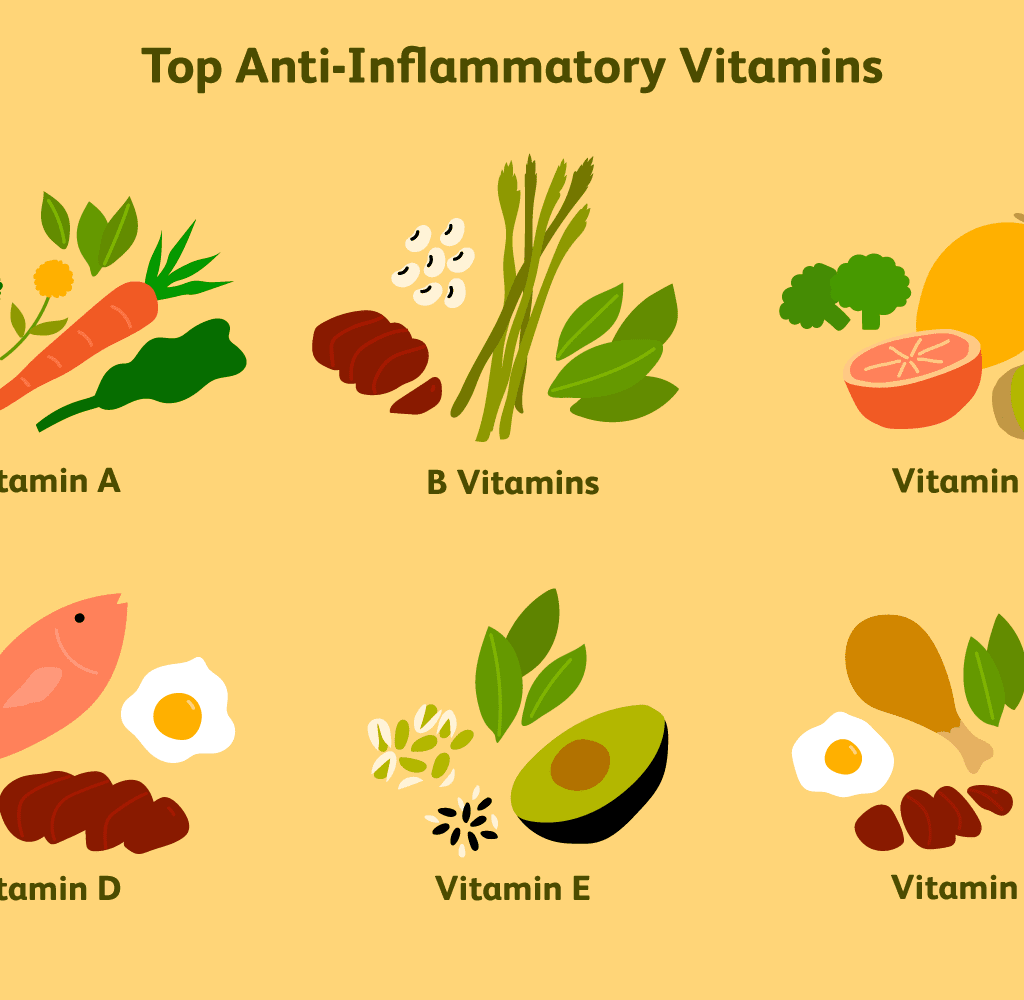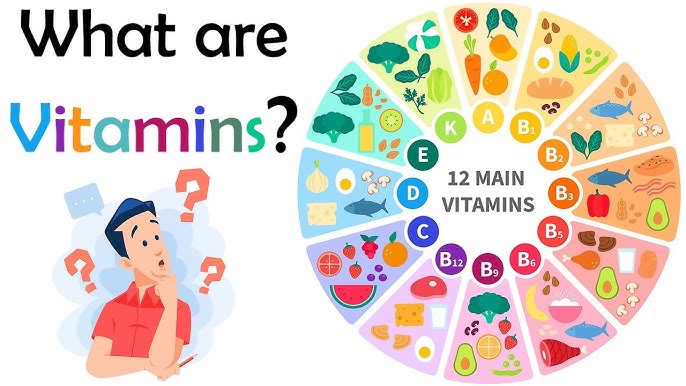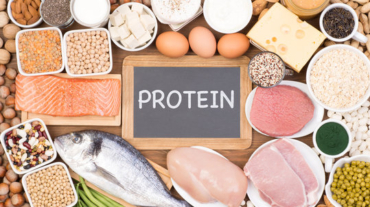WHAT IS VITAMIN?
A vitamin is an organic compound that is essential for normal growth, metabolism, and overall health. Vitamins are needed in small quantities because the body cannot produce them on its own (or not in sufficient amounts), so they must be obtained from the diet or supplements. There are 13 essential vitamins, including vitamin A, C, D, E, and the B vitamins (like B1, B2, B3, B6, B12, folate, etc.). Each vitamin plays specific roles in bodily functions, such as immune support, energy production, and tissue repair.
Vitamins are a group of essential organic compounds that the body needs to function properly. These nutrients play critical roles in maintaining overall health and supporting various biological processes, such as metabolism, immune function, and tissue repair. Since the human body cannot synthesize most vitamins in sufficient quantities, they must be obtained from food sources or supplements.
There are 13 essential vitamins, which are classified into two categories:
•Fat-soluble vitamins (A, D, E, and K) – These are stored in the body’s fat tissues and liver and can be used when needed. They tend to stay in the body longer.
•Water-soluble vitamins (C and the B-vitamins) – These are not stored in the body for long and need to be replenished regularly through diet.

Each vitamin has a specific function; for instance, vitamin C supports the immune system, vitamin D helps with calcium absorption, and B vitamins are vital for energy production. A balanced diet, rich in a variety of foods, is typically the best way to ensure adequate vitamin intake.
TYPES OF VITAMINS
Vitamins are classified into two main types based on how they are absorbed, stored, and excreted by the body:
- Fat-Soluble Vitamins-:
These vitamins are absorbed along with fats in the diet and are stored in the body’s fatty tissues and liver. They tend to stay in the body for longer periods of time.

•Vitamin A :Important for vision, immune function, and skin health. Found in liver, carrots, sweet potatoes, and leafy greens.
•Vitamin D :Essential for calcium absorption, bone health, and immune function. Found in sunlight exposure, fortified milk, and fatty fish.
•Vitamin E: Acts as an antioxidant, protecting cells from damage. Found in vegetable oils, nuts, seeds, and leafy greens.
•Vitamin K: Crucial for blood clotting and bone health. Found in leafy greens, broccoli, and Brussels sprouts.
- Water-Soluble Vitamins-:
These vitamins dissolve in water and are not stored in the body for long. Excess amounts are typically excreted through urine, so they need to be replenished more regularly.
•Vitamin C :Vital for immune function, wound healing, and the maintenance of healthy skin and connective tissues. Found in citrus fruits, berries, and bell peppers.
•B-Vitamins:
B1 :Important for energy production and nervous system health. Found in whole grains, pork, and beans.
B2 :Supports energy production and skin health. Found in dairy products, eggs, and green vegetables.
B3 :Helps in energy production and supports skin health. Found in meat, poultry, and whole grains.
B5 :Involved in energy metabolism and hormone production. Found in chicken, beef, potatoes, and oats.
B6 :Supports brain function and helps in the production of neurotransmitters. Found in poultry, fish, and potatoes.
B7 :Important for hair, skin, and nail health, and metabolism. Found in eggs, nuts, and seeds.
B9 :Crucial for cell division and pregnancy health. Found in leafy greens, legumes, and fortified grains.
B12: Important for nerve function and the production of red blood cells. Found in animal products like meat, fish, and dairy.
Each vitamin has a unique function in the body, and a deficiency in any of these essential nutrients can lead to various health problems. A balanced and varied diet is the best way to ensure sufficient intake of all vitamins.
*IF YOU ARE NOT DEFICIENT IN SPECIFIC VITAMIN THEN YOU WILL NOT TAKE VITAMIN FOR THAT DEFICIENCY? (YES/NO)
That’s correct! If you are not deficient in a specific vitamin, you generally do not need to take a supplement for that vitamin. The body only requires vitamins in small amounts, and when you get adequate amounts from your diet or natural sources, there’s typically no need to take extra supplements.
Taking excess vitamins, especially fat-soluble ones like vitamins A, D, E, and K, can sometimes lead to toxicity since they are stored in the body for longer periods. This can cause harmful side effects.


- RECOMMEND DIETARY ALLOWANCE-:
The Recommended Dietary Allowance (RDA) for vitamins varies by age, gender, life stage (e.g., pregnancy), and health condition. Below are the RDAs for adults based on general guidelines provided by health authorities like the National Institutes of Health (NIH) and other organizations. These recommendations are for healthy adults (ages 19 and older).
- Vitamin A
•Men: 900 micrograms (mcg) of retinol activity equivalents (RAE) per day
•Women: 700 mcg RAE per day. - Vitamin C
•Men: 90 milligrams (mg) per day
•Women: 75 mg per day. - Vitamin D
•Men & Women (19-70 years): 600 IU (15 mcg) per day
•Men & Women (71+ years): 800 IU (20 mcg) per day. - Vitamin E
•Men & Women: 15 milligrams (mg) per day (22.4 IU). - Vitamin K
•Men: 120 micrograms (mcg) per day
•Women: 90 mcg per day. - Vitamin B1
•Men: 1.2 mg per day
•Women: 1.1 mg per day. - Vitamin B2
•Men: 1.3 mg per day
•Women: 1.1 mg per day. - Vitamin B3
•Men: 16 mg per day
•Women: 14 mg per day. - Vitamin B5
•Men & Women: 5 mg per day. - Vitamin B6
•Men & Women (19-50 years): 1.3 mg per day
•Men (51+ years): 1.7 mg per day
•Women (51+ years): 1.5 mg per day. - Vitamin B7
•Men & Women: 30 micrograms (mcg) per day. - Vitamin B9
•Men & Women: 400 mcg DFE (Dietary Folate Equivalents) per day
•Pregnant women: 600 mcg DFE per day
•Lactating women: 500 mcg DFE per day. - Vitamin B12
•Men & Women: 2.4 micrograms (mcg) per day.
These values represent the adequate intake levels for maintaining health in most individuals. However, individual needs may vary based on factors like specific health conditions, dietary patterns, lifestyle (e.g., smoking, alcohol use), and life stage (e.g., pregnancy, breastfeeding). For example, pregnant and breastfeeding women may require higher amounts of certain vitamins (like folate, vitamin D, and vitamin B12).
*In conclusion, vitamins are essential micronutrients that play crucial roles in maintaining overall health and supporting various bodily functions, including metabolism, immune response, and tissue repair.Each vitamin has a unique function, and a deficiency in any one of them can lead to health problems.
A balanced and varied diet, rich in fruits, vegetables, whole grains, lean proteins, and healthy fats, is the best way to ensure adequate vitamin intake. In most cases, supplementation is unnecessary if you are consuming sufficient vitamins from your diet, though specific groups of people (e.g., pregnant women, the elderly, those with certain health conditions) may benefit from additional supplementation.
It’s important to be mindful of the Recommended Dietary Allowances (RDAs) for each vitamin to avoid both deficiencies and the risks of excessive intake, particularly for fat-soluble vitamins. As always, consulting a healthcare professional or a registered dietitian is advisable when considering supplementation or making significant dietary changes to ensure optimal health and well-being.
Manushree Kaushik
Nutrition consultation
MSc (Food & Nutrition)
Gold Medalist
Onerehab24by7


